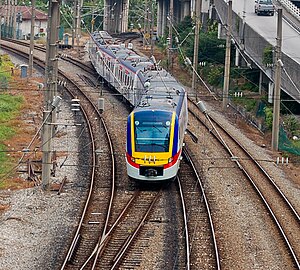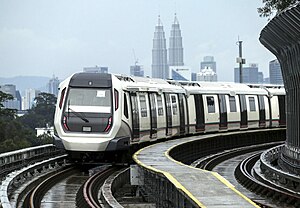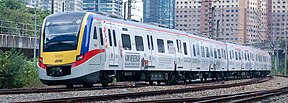Klang Valley Integrated Transit System
| Klang Valley Integrated Transit System | |
|---|---|
| Overview | |
| Native name | Sistem Transit Bersepadu Lembah Klang (Malay) |
| Locale | Klang Valley |
| Transit type | Commuter rail, rapid transit & bus rapid transit |
| Number of lines | 11 |
| Number of stations | 197 transit stations |
| Daily ridership | 927,113 (2024)[1] (only Rapid KL) |
| Annual ridership | 248,434,575 (2023)[2] |
| Website | https://myrapid.com.my/ |
| Operation | |
| Began operation | 14 August 1995 |
| Operator(s) | |
| Technical | |
| System length | 555.7 km (345 mi) |
| Track gauge | |
| Electrification | |
The Klang Valley Integrated Transit System is an integrated transport network that primarily serves the area of Klang Valley and Greater Kuala Lumpur. The system commenced operations in August 1995 with the introduction of commuter rail service on the existing rail between Kuala Lumpur and Rawang. The system have since expanded and currently consists of 11 fully operating rail lines in a radial formation; two commuter rail lines, six rapid transit lines, one bus rapid transit line and two airport rail links to the Kuala Lumpur International Airport's (KLIA) Terminal 1 and Terminal 2, and one temporarily suspended airport rail link to the Sultan Abdul Aziz Shah Airport. The system encompasses 528.4 kilometres (328.3 mi) of grade-separated railway with 197 operational stations.
History
[edit]Rail transit in Kuala Lumpur and Selangor began in 1886 when a railway line from Kuala Lumpur to Bukit Kuda (just outside Klang) was opened. The line remains operational to this day as the Tanjung Malim-Port Klang Line.

STAR LRT, a light metro system, was first conceived in the 1981 Transport Master Plan, when the Malaysian government proposed a network of light rapid transit (LRT) lines connecting Kuala Lumpur city centre with the surrounding areas. An agreement was signed between the government and STAR in 1992.[3]
The first rail transit system to provide local rail services in Kuala Lumpur and the surrounding Klang Valley suburban areas was introduced on August 14, 1995, as the KTM Komuter.[4] A year later in December 1996, STAR LRT entered into service, followed by the PUTRA LRT which opened in stages beginning September 1998.[5]
The initial plan was for STAR and PUTRA to build, own and manage the LRTs. However, both companies ran into financial difficulties and were heavily in debt by 2001, which led to the government taking over both LRTs via Syarikat Prasarana Negara Bhd, now known as Prasarana Malaysia Bhd.[6][7] The LRT lines were subsequently renamed to LRT Ampang and Sri Petaling Lines, and LRT Kelana Jaya Line respectively.
In April 2002, Express Rail Link, which began construction in May 1997, entered into service, with two lines that connect KL Sentral to the newly built Kuala Lumpur International Airport (KLIA) (now KLIA Terminal 1). The lines were extended to KLIA's Terminal 2 (then known as klia2) in 2014.
In 2003, the KL Monorail opened to service. However, the operator and owner of the line KL Monorail System Sdn Bhd quickly ran into financial difficulties and the service was again taken over by Prasarana in 2007.[8]
In 2015, the BRT Sunway Line entered into service, serving the densely populated Sunway area.[9]
In 2016, the Sri Petaling Line was extended to Putra Heights with 11 new stations. The Kelana Jaya Line was similarly extended to Putra Heights with 17 new stations. The extension of both lines serve the Puchong Jaya and Subang Jaya areas.[10][11]
On 16 December 2016, Phase 1 of the MRT Kajang Line which spans 23 km from opened between Sungai Buloh to Semantan. On July 17, 2017. Phase Two of the line from Semantan to Kajang began operations.[12]
The MRT Putrajaya Line was official launched on 16 June 2022 at 3pm.[13] Phase 2 of the line was subsequently launched on March 16, 2023.[14]
The LRT Shah Alam Line which is still under construction is scheduled to open in August or September 2025.[15][16]
Integration
[edit]Initially, different competing companies operated the various transit systems and had developed these rail and bus systems separately and at various times. As a result, many of these systems did not integrate well with the others, making transferring from system to system inconvenient for passengers. Aggravated by Kuala Lumpur's poor pedestrian network, moving from one rail system to another often required a lot of walking, stair-climbing, and escalator-use.
Since 28 November 2011, the paid areas of shared stations along the Rapid KL system for the Kelana Jaya Line, Ampang Line, and Sri Petaling Line, as well as the KL Monorail from 1 March 2012, have been integrated physically under a common ticketing system, effectively making those stations interchange stations. This enables commuters to transfer between lines at the interchange stations without buying a new ticket each time, provided that they do not exit the paid area. This is currently possible at the Titiwangsa, Hang Tuah, Putra Heights, and Masjid Jamek stations. With the opening of the latest rapid transit lines on 17 July 2017 and 16 June 2022, the Kajang Line and Putrajaya Line respectively, the integrated system has been expanded to Pasar Seni, Merdeka-Plaza Rakyat, Maluri, Tun Razak Exchange, Chan Sow Lin, Kwasa Damansara and Sungai Besi stations, and to USJ 7 station with the launching of the BRT Sunway Line.
The KTM Komuter lines and Express Rail Link (ERL) lines implement their own ticketing systems and only allow integration between their respective rail lines.
Fares
[edit]The Touch 'n Go stored value fare card is accepted as a mode of payment on the Rapid Bus system, LRT, MRT, BRT, and monorail lines, as well as the KTM Komuter and ERL lines, easing the hassle of buying separate tickets for travelling on different networks. However, the fare integration for the Rapid KL system does not include KTM Komuter and Express Rail Link.
Rapid Rail, the operator of the LRT, MRT and monorail lines, and Rapid Bus (which covers about 70% of the Klang Valley's bus network as well as the BRT Sunway Line), provide various daily and monthly passes for commuters.[17]
Since February 2024, KTM Kommuter services started accepting credit and debit card as payment method, including NFC based mobile payment services such as Apple Pay, Google Pay and Samsung Pay.[18] Rapid KL services are slated to follow suit with the implementation of open payment system starting March 2024 and concluding by March 2025.[19]
System network
[edit]The KTM Komuter, a commuter rail service, provide local rail services in Kuala Lumpur and the surrounding Klang Valley suburban areas. Light rapid transit (LRT) lines and monorail line were introduced later on to serve the urban Kuala Lumpur area and its satellite towns. (i.e. Ampang, Petaling Jaya, Subang Jaya, Puchong, Gombak, etc.) The mass rapid transit (MRT) lines aims to connect the outskirts of the Klang Valley (i.e. Damansara, Sungai Buloh, Putrajaya, Kajang) with the city centre. Malaysia's first bus rapid transit (BRT) line was introduced to ease pedestrian traffic in Bandar Sunway, a thriving leisure and entertainment township in Subang Jaya. 3 airport rail links connect the city centre with the 2 major airports of the Klang Valley, two to the Kuala Lumpur International Airport's (KLIA) Terminals 1 and 2, and one to the Sultan Abdul Aziz Shah Airport.
Proposed and future lines
[edit]
The fourth LRT line, the Shah Alam Line is also under the construction phase.[23] The construction of the third KVMRT line, the Circle Line is expected to commence in 2027.[24]
| Line Number | Line Name | Stations | Length | Status | Planned Opening | Terminus | |
|---|---|---|---|---|---|---|---|
| 11 | Shah Alam Line | 25 | 37 km | Under Construction | 30 September 2025 | Bandar Utama | Johan Setia |
| 13 | Circle Line | 31 | 50.8 km | Undergoing land acquisition[25] | TBA | Bukit Kiara Selatan | UM |
| 14 | Putrajaya Monorail | 25 | TBA | Shelved since 2004[26] | TBA | Putrajaya Sentral | Kajang & Cyberjaya |
| B2 | BRT Federal Line | 24 | 32.52 km | Shelved on 28 November 2017 | N/A | Pasar Seni | Klang |
Rolling stock
[edit]| Line Code | Line Name | Formation | In service On order | Rolling Stock | Manufacturers | Image |
|---|---|---|---|---|---|---|
| 1 | Batu Caves-Pulau Sebang Line | 6 carriage EMU | 37 trainsets (222 car) | KTM Class 92 |  | |
| 2 | Tanjung Malim-Port Klang Line | |||||
| 3 | Ampang Line | 6 carriage high-floor LRV | 50 trainsets (300 car) | CRRC Zhuzhou LRV "AMY" |  | |
| 4 | Sri Petaling Line | |||||
| 5 | Kelana Jaya Line | 2 carriage Linear induction EMU | 35 trainsets (70 car) | Bombardier Innovia ART 200 |  | |
| 4 carriage Linear induction EMU | 35 trainsets (140 car) | |||||
| 14 trainsets (56 car) 27 trainsets (108 car) | Bombardier Innovia Metro 300 | *Consortium |  | |||
| 6 | KLIA Ekspres | 4 carriage EMU | 8 trainsets (32 car) | Siemens Desiro ET 425 M |  | |
| 2 trainsets (8 car) | CRRC Changchun "Equator EMU" |  | ||||
| 7 | KLIA Transit | 4 trainsets (16 car) | Siemens Desiro ET 425 M |  | ||
| 4 trainsets (16 car) | CRRC Changchun "Equator EMU" |  | ||||
| 8 | KL Monorail | 4 carriage monorail EMU | 9 trainsets (36 car) | Scomi SUTRA |  | |
| 9 | Kajang Line | 4 carriage EMU | 58 trainsets (232 car) | Siemens Inspiro "The Guiding Light" | *Consortium |  |
| 10 | KL Sentral-Terminal Skypark Line | 3 carriage EMU | 4 trainsets (12 car) | KTM Class 83 |  | |
| 11 | Shah Alam Line | 3 carriage LRV | 25 trainsets (75 car) | CRRC Zhuzhou LRV | *Consortium | |
| 12 | Putrajaya Line | 4 carriage EMU | 49 trainsets (196 car) | Hyundai Rotem EMU "Ducky" | *Consortium |  |
| B1 | BRT Sunway Line | Single-deck bus | 15 battery run-electric bus | BYD K9 |  |
Notes
[edit]- ^ Batu Caves branch line formerly under Port Klang Line
- ^ Train service of Port Klang Line extend to Tanjung Malim
- ^ Use the same KTM track for Subang Jaya-KL Sentral section
- ^ Counting interchange stations (paid area integration) and connecting stations (non-paid area integration) within same station building only once.
References
[edit]- ^ "Rapid Rail Performance Update".
- ^ "Rail Services Performance".
- ^ An LRT-Bus strategy for greater Kuala Lumpur: What future integration?, page 9-10
- ^ Radhi, Nor Ain Mohamed (20 September 2020). "NST175: A long journey from steam to electric | New Straits Times". NST Online. Retrieved 16 January 2025.
- ^ "Klang Valley urban rail service turns 10 - Community | The Star Online". 25 April 2017. Archived from the original on 25 April 2017. Retrieved 17 February 2024.
- ^ "Cover Story: Malaysian rail's chequered past". The Edge Malaysia. Retrieved 17 February 2024.
- ^ LRT to be bailed out, govt confirms
- ^ "Syarikat Prasarana Negara in talks to take over KL monorail". The Edge. Kuala Lumpur. 24 April 2007. Archived from the original on 27 April 2007. Retrieved 25 April 2007.
- ^ menon, priya. "Bandar Sunway folk can now beat the jam". The Star. Retrieved 17 February 2024.
- ^ "Temporary suspension of LRT Ampang, Sri Petaling lines". The Star. Kuala Lumpur. 17 June 2016.
- ^ "Alternate Train Service from Putra Heights from 30 June 2016". RapidKL. 29 June 2016. Archived from the original on 2 July 2016. Retrieved 25 November 2018.
- ^ "PM picks '17-7-2017' start date for MRT phase two | Malay Mail". Archived from the original on 26 December 2017. Retrieved 17 February 2024.
- ^ "First phase of Putrajaya Line opens on June 16". Freemalaysiatoday. 21 May 2022. Retrieved 2 June 2022.
- ^ "Putrajaya MRT line set for full opening on March 16". Freemalaysiatoday. 3 March 2023. Retrieved 3 March 2023.
- ^ Tan, Danny. "LRT3 Shah Alam Line to start operations in Q3 2025 – delay from March target, physical work 95% complete". Paul Tan's Automotive News. Retrieved 29 July 2024.
- ^ "LRT3 to begin taking passengers by 3Q next year, says Loke". New Straits Times. Retrieved 29 July 2024.
- ^ "My50". MyRapid. Retrieved 17 February 2024.
- ^ Feb 09, seitha on; Pm, 2024 at 4:09 (9 February 2024). "KTM open payment system launched - debit/credit cards, Apple/Samsung Pay for Komuter; ETS excluded - paultan.org". Paul Tan's Automotive News. Retrieved 17 February 2024.
{{cite web}}: CS1 maint: numeric names: authors list (link) - ^ "Rapid KL To Start Work On Open Payment System From March 2024 - Lowyat.NET". 26 October 2023. Retrieved 17 February 2024.
- ^ "Kelana Jaya Line". Prasarana Malaysia. Archived from the original on 30 March 2014. Retrieved 12 June 2014.
- ^ "KL Monorail Line". Syarikat Prasarana Negara. Archived from the original on 30 March 2014. Retrieved 12 June 2014.
- ^ Razak Ahmad, Hemananthani Sivanandam (17 July 2017). "Najib launches Phase 2 of Sungai Buloh-Kajang MRT line". The Star.
- ^ Ali, Sharidan M (13 December 2014). "Prasarana to roll out LRT 3 projects by second half of 2015 - Business News | The Star Online". Thestar.com.my. Retrieved 15 April 2015.
- ^ "MRT3 Circle Line construction only starting in 2027 - paultan.org". Paul Tan's Automotive News. 19 November 2024. Retrieved 17 January 2025.
- ^ www.malaymail.com https://www.malaymail.com/news/malaysia/2023/12/21/mrt3-land-acquisition-process-to-start-in-stages-next-year-says-anthony-loke/108657. Retrieved 8 February 2025.
{{cite web}}: Missing or empty|title=(help) - ^ Sallehuddin, Qistina (27 June 2023). "No plans to revive the suspended monorail project". New Straits Times. Retrieved 29 July 2024.


 French
French Deutsch
Deutsch






